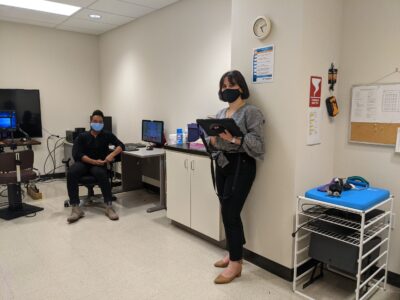A Year Ago Today
One year ago, the Retina Foundation temporarily closed its doors to help stop the spread of the new coronavirus. Looking back on the past year, we were able to successfully navigate this new challenge, and continue with our mission to prevent vision loss and restore sight through innovative research and treatment.
Our research scientists and staff have navigated the pandemic quite well. Working remotely allowed for a rare opportunity to focus largely on data analysis, manuscript preparation, and the formulation of new research ideas. In fact, our scientists wrote and published over 50 articles and book chapters in the last year. New research projects have launched; in addition, we modified ongoing research projects by incorporating at-home telemedicine visual acuity tests for children with pediatric eye conditions, moved questionnaires to an online platform, and used remote access tools and servers for processing a large quantity of retina pictures. After a brief shutdown, the Retina Foundation has since safely reopened with protocols of masks, temperature and medical history checks, sanitizing, staggered patient appointments, and expanded waiting areas.
Like much of the world, the Retina Foundation has increasingly relied on virtual platforms, such as Zoom, to operate during the pandemic. Foundation-wide meetings, board meetings, and committee meetings all resumed virtually early on so that progress in our mission did not stall. Our Development team organized novel streaming content in the form of a six-week video series followed by a monthly livestream Scientist Hour series to bring our groundbreaking research straight into your homes. Additionally, we reached a larger and more international audience for our popular Keeping an Eye on Innovation Lecture Series, a format that we hope to continue post-pandemic. Finally, our scientists have virtually presented their cutting-edge research at over 50 national and international vision and ophthalmology research conferences and talks.
With that, the year of 2020 was meant to be the year of vision. However, children and adults with vision impairments may not be getting adequate care due to factors related to the pandemic, including missed school screenings, delayed doctors’ appointments, and being uninsured. Therefore, it is more important now than ever to continue our mission of preventing vision loss and restoring sight. While 2020 wasn’t quite the year we were expecting, acts of generosity and support from our community did not waiver, and for that we’re grateful. As we positively look ahead to 2021, we will remain steadfast in our important mission in continuing to do our part to keep our community safe while conducting cutting-edge research to make a lifetime of good vision a reality for everyone.

Related Articles
Recently@Retina Newsletter November 2023 Meet Sharon and Harold Hosack Recently@Retina Newsletter March 2024 Clinical Center of Innovation for Age-Related Macular Degeneration Retina foundation showcases breakthroughs for treatment of age-related macular degeneration during eye on innovation conversation series